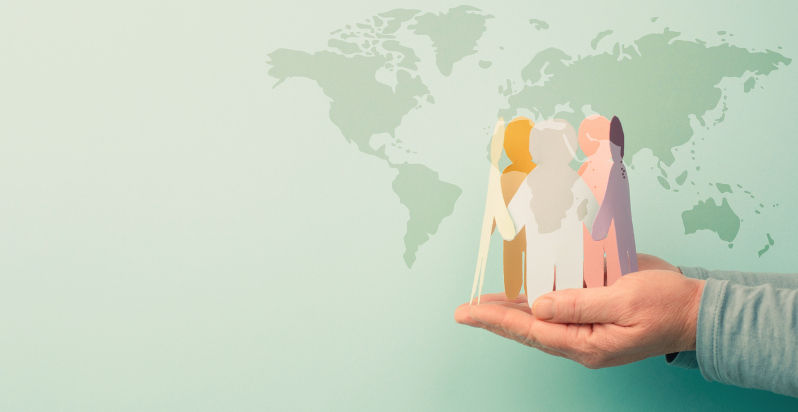Reuniting families: reforming Australia’s approach
October 16, 2025
Saffron Williams is one of six talented young Australians who will travel to the UN General Assembly in New York next week as part of the Global Voices project.
They take with them policy position papers on highly topical legal issues. Over the coming days, we will get a glimpse into the ideas and ambitions of these young leaders.
-——————————————————————————————–
When I first began studying law, I was driven by a need to create change in the world. Coming from a mixed-race background, my interests have always centred on equality across education, health and opportunity. That conviction took on new meaning when I saw the human impact of Australia’s refugee policies up close.
My partner, a Syrian refugee, fled his country after years of war and uncertainty. After finally rebuilding his life in Australia, he has spent almost a decade separated from his siblings, who remain displaced in Lebanon. For me, witnessing the pain of that distance, the birthdays missed and the voice calls that replace real embraces, turned a personal heartbreak into a policy question: why does family unity still fall through the cracks of Australia’s humanitarian system?
The missing pillar of protection
In international law, the right to family unity is fundamental. The Universal Declaration of Human Rights recognises the family as the “natural and fundamental group unit of society”, deserving of protection by both state and society. Yet in Australia’s humanitarian framework, family reunification remains inconsistent, discretionary and painfully slow.
Under the current system, refugees and humanitarian entrants may apply to bring immediate family members to Australia, but in practice, there are long delays, opaque decision-making, and prohibitive costs. For those with family members in conflict zones or stateless conditions, the absence of clear statutory time frames can mean waiting indefinitely.
My policy paper for the 2025 Global Voices Fellowship, Reforming Australia’s Refugee Family Reunification Framework, calls for a structural response to this gap. It proposes the creation of a dedicated Family Unity Visa stream within the Humanitarian Program, supported by statutory decision-making time frames and prioritised processing for separated families.
The current system often reduces family unity to an afterthought. We need to recognise it as a core part of refugee protection, not a privilege to be earned after years of uncertainty.
A law student’s path to policy
I am completing a Bachelor of Law and Legal Practice degree at Flinders University and work in the emergency department at Lyell McEwin Hospital. Balancing law, healthcare and humanitarian advocacy might seem like an unlikely mix, but for me, it reflects a consistent theme: compassion within systems.
I see every day how institutions can either humanise or dehumanise. In the hospital, we treat people at their most vulnerable. In law and policy, we often forget that vulnerability deserves the same immediacy.
My selection as one of the 2025 Global Voices Fellows will allow me to attend the United Nations General Assembly Sixth Committee in New York, where I will observe international legal discussions and bring those insights back to my research. During the fellowship’s Canberra briefings, I met officials from the Department of Home Affairs, Lexbridge Lawyers and Department of Foreign Affairs and Trade to explore the intersection of domestic policy and international human rights obligations.
What stood out to me was that almost everyone agreed on one thing: Australia can do better. No one wants to keep families apart. The issue isn’t a lack of empathy, it’s a lack of structure and political will.
Hope as a form of policy
My proposal emphasises that reforming family reunification policy isn’t just an act of kindness, it’s an act of governance. A dedicated visa stream with statutory time frames would bring consistency, transparency and accountability, ensuring families are not left waiting indefinitely.
My vision extends beyond paperwork and I hope for an Australia where humanitarian protection includes the right to rebuild one’s family.
I think about my partner’s siblings. They’ve built new lives in Lebanon, but they still dream of being together again. That dream shouldn’t depend on luck or waiting lists. It should be something the law protects.
From policy to purpose
For me, the journey to the UN General Assembly is about honouring those stories and turning empathy into evidence-based reform.
I hope that by sharing my perspective, as a law student and as someone who has witnessed both the resilience of refugees and the limits of Australia’s systems, I can help humanise policy discussions that too often feel abstract.
Sometimes people think refugee policy is about numbers, security, or budgets. But at its heart, it’s about love, the love that makes people cross borders, that keeps them fighting to reunite, that helps them start again. If our laws can’t make space for that, then they’re missing something profoundly human.
Looking forward
As I prepare to take my ideas to New York, I carry with me both legal analysis and empathy. I know that change won’t happen overnight, but I believe it begins with voices, the kind that tell stories not in statistics, but in hope.
My message is clear: family is not a privilege. It is a right that should anchor Australia’s humanitarian promise.
Global Voices is a youth-led Australian not-for-profit committed to developing the next generation of policy leaders by providing practical experience in policy-making, international relations and diplomacy. The fellowship involves predeparture briefings in Canberra, travel to a high-level international summit and the publication of a policy paper that contributes a fresh perspective to Australian legislation.
The views expressed in this article may or may not reflect those of Pearls and Irritations.

